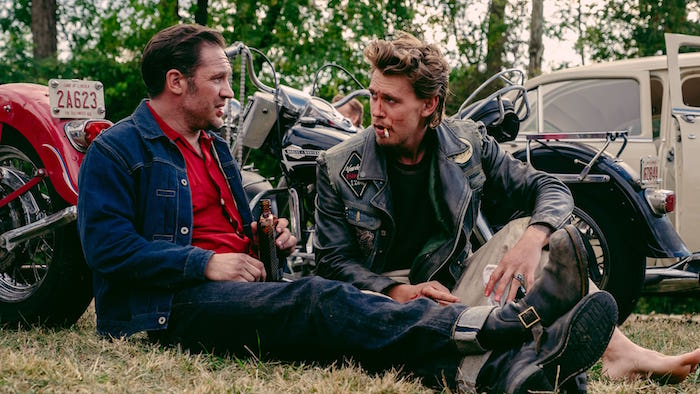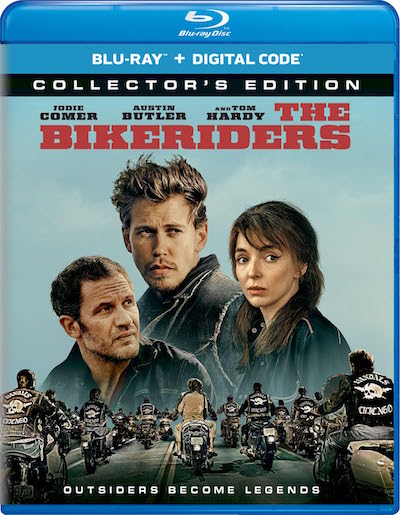
In 1968, a year before the release of Easy Rider, photojournalist Danny Lyon published a book of black and white photos, along with accompanying interviews, about the Outlaws Motorcycle Club. Despite being set in Chicago, Jeff Nichols feels like the perfect director to bring those photos to life in The Bikeriders. The Arkansas-born filmmaker has crafted remarkable pictures about masculinity and blue-collar life in rural America beginning with his fiery debut Shotgun Stories to his sophomore effort, the eerie Take Shelter.
West Side Story star Mike Faist plays the fictionalized Lyon as he interviews Kathy Bauer (Jodie Comer), who serves as the sharp tongued narrator of the movie. Kathy recounts going to a biker bar with her best friend. She is instantly repulsed by the majority of the bikers there, but finds instant attraction with the sullen Benny Cross (Austin Butler). The two of them barely say a word to one another before Benny gives Kathy a ride home. Benny’s next move is to park across the street, much to the consternation of Kathy’s boyfriend, who winds up storming off in a huff. Benny doesn’t waste a second before moving in.
He quickly introduces Kathy to Johnny Davis (Tom Hardy), who founded the Vandals Motorcycle Club after watching that iconic scene of Marlon Brando in The Wild One, “What are you rebelling against, Johnny?” “Whaddya got?”
Joining their ranks are loyal lieutenant Brucie (Damon Herriman), best buds Wahoo (Beau Knapp) and Corky (Karl Glusman), expert mechanic Cal (Boyd Holbrook), shaggy Zipco (Michael Shannon), lovable goof Cockroach (Emory Cohen), and California hippie Funny Sonny (Norman Reedus). Life as a Vandal isn’t exactly Sons of Anarchy. Even when the boys get into a brawl with a rival gang at a picnic, everyone winds up swapping beers and stories. The worst thing that happens is Benny nearly having his foot lopped off with a shovel during a bar fight after refusing to remove his colors. Kathy now comes to the realization that Benny just might die if he stays with the Vandals. Even worse, it’s a portend for events to come as the gang grows from a tight-knit circle of friends to a massive organization spanning several cities in the Midwest. The newer members are partial to violence and drugs with little respect for the originals.
Nichols certainly takes a romantic approach to the subject matter. In real life, the Outlaws were a whites-only club and some of their members wore confederate flags or Nazi symbols on their clothing. All that’s been washed away though an Iron Cross pops up here and there. The real Benny was also physically abusive towards his wife. None of that is here. Instead, Nichols chooses to focus on the freedom that comes from riding a motorcycle down an open road with one hand on the handlebars. Back at a time when a man thought more about his leather and denim than the lack of a helmet on their head. The film’s turn to the darker side is reminiscent of Boogie Nights in that it marks a change in the lives of our protagonists as well as society as a whole.
The Bikeriders aims to evoke the new wave of 60’s and 70’s cinema. This is in no small part due to the performance of Tom Hardy, who is clearly channeling Brando. Hardy has a quiet intensity in every scene and cuts an immediately imposing presence. If Hardy is Brando, then Butler is in full James Dean mode with a heavy touch of his award-winning performance as Elvis. He is literally the dictionary definition of smoldering. The British-born Jodie Comer carries the majority of the movie when it comes to dialogue, all of which is affected with a slightly nasally Midwestern accent. Comer is like a dialed down Frances McDormand in Fargo mixed with Lorraine Bracco in Goodfellas. Although most of the supporting cast receives limited screen time, many of them attempt to make the most of what they’re given. In particular, Michael Shannon gives a riveting monologue revealing his rejection by the military and his seething hatred for “Pinkos.”
Video/Audio: 9
The video is presented in 1080p with an aspect ratio of 2.39:1. The transfer is vivid and clean with a slight sepia tone that adds to the filmic quality of the disc. Fine details shine through such as the fraying on the denim jackets and the stubble on the faces of the riders.
The audio is presented in Dolby Atmos with dialogue coming in crisp and clear. The roar of the motorcycles throughout the field.
Nichols is too smart a filmmaker to throw in cliched standards like “Born to Be Wild.” The soundtrack is littered with classic rock gems from The Stooges, The Animals, and Muddy Waters. The Shangri-Las are here, but represented by “Out in the Streets” and “I’ll Never Learn,” instead of “Leader of the Pack.”
Extras: 4
Johnny, Benny & Kathy (4:56) is a quick look at the three leads of the film, how they approached their characters, and Jodie Comer’s work with a dialect coach.
The Era of The Bikeriders (3:22) is a behind-the-scenes featurette about recreating the era and the actors legitimately learning how to ride their bikes.
The Filmmaker’s Eye: Jeff Nichols (2:57) looks at the director’s process and how excited members of the cast and crew were to work with him.
Rounding out the disc is a commentary track with Jeff Nichols, who discusses how he transformed a book of photos to a feature length film, the soundtrack, the cast, and locations.
Film Value: 7
The Bikeriders is a brooding and nostalgic treatise of Middle America as seen through the glistening chrome of a classic Harley Davidson. The movie doesn’t speed along like a bat out of hell, but glides comfortably like it shifted into neutral.

